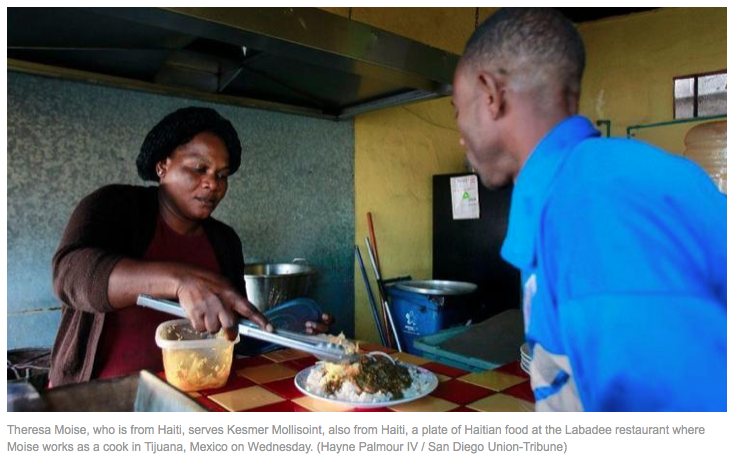
Julio Viaje, 30, had lunch last week in a Haitian restaurant in Tijuana and watched a European soccer game with friends while waiting for his bartending shift to start.
One of more than 3,000 Haitian migrants living in Tijuana, Viaje works at an upscale restaurant in the city called Los Arcos. When he arrived at the Mexican border two years ago, he worked construction and slept in a migrant shelter. Today, he rents an apartment.
Since more than 6,000 Central American migrants arrived to Tijuana this November, the city’s residents and politicians have lauded the Haitian community as an example of how to assimilate to life in Mexico.
During a press conference, Tijuana Mayor Juan Manuel Gastelum said the Haitians came in an orderly way and with a clear vision. They got jobs and did not cause any problems.
“It makes me proud that Mexicans speak well of us,” Viaje said. “We worked very hard.”
His advice to Central American migrants: get a job.
“If they come to work they will do well,” he said. “But if they do not want to work they will suffer. How are they going to buy food? The people are not going to support them forever.”
Haitian migrants in Tijuana have gotten jobs as street vendors, cooks, security guards, mechanics, business owners or workers in maquiladoras.
Some have enrolled in university programs and married Tijuana residents. Others have become Mexican citizens, according to interviews with more than a dozen migrants and Tijuana residents who work closely with the city’s Haitian community.
Jeff Kenson opened a barber shop in Tijuana about 20 months ago. His customers are both Mexicans and Haitians.
“It makes me happy to see Haitians with cars and houses,” said Kenson, 29.
One of the big differences between the Haitian migrants and the Central American caravan is that the former had money when they arrived to Tijuana in 2016. Many worked construction jobs building Brazil’s World Cup stadiums and left the country when the economy collapsed.
Kenson owned his own barber shop in Brazil. He originally saw Tijuana as a rest stop on the way toward the United States but decided to stay when he thought the U.S. would deport him back to Haiti.
Although there are several success stories among Tijuana’s Haitian populations, they aren’t universal.
Privert Prophete, a 52-year-old construction worker says he struggles to make ends meet. None of his friends have bought a car or a house in Tijuana.
He currently has a Mexican work permit through a humanitarian visa and hopes to be eligible for a resident visa within two years. That will allow him to bring his family, a wife and three children, to Tijuana from Haiti.
“I am alone here,” he said. “If I get sick, I have no one. If I die, I die alone.”
The Haitians’ assimilation to Tijuana has not always been a smooth transition. A group of 11 people formed the Association of Defense for Haitian Migrants one year ago to help people navigate different bureaucratic processes.
More than 500 people have joined, said Philocles Julda, 44, one of the founding members.
“We thought that if we didn’t unite, there were things we wouldn’t be able to do,” he said.
Initially, the association helped migrants secure documents and work permits but the process hasn’t always been easy. Julda said he’s gone eight months without a work permit because of bureaucratic hurdles and missing paperwork.
More recently, they’ve helped pregnant women secure access to local hospitals, Julda said.
The majority of Haitians in Tijuana would rather be back home but they know there are no jobs so they do the best they can with what they have in Mexico, he added.
“We earn enough to live,” he said. “It’s better than not having anything. That is why people stayed here.”
There are about 70 Haitian migrants living in a church-run shelter, El Templo Embajador, according to Pastor Gustavo Banda.
Banda said most of them have work permits and, those who do, plan to get their residential visas as soon as they are eligible so they can bring their families to Tijuana.
Banda credits the Haitian community’s success to their religion and said they should be an example to everyone.
“They have Christian principles and that helped them behave in a more organized way,” he said. “I didn’t see any of them smoking marijuana or drinking in public.”
Word of Tijuana’s Haitian community has spread throughout Latin America. Eva Auguste, 24, moved to Tijuana from Venezuela three months ago.
Her plan was to go to the U.S. but when that didn’t work out she decided to stay. She earns about $70 a week braiding hair.
“The whole world wants to go to the United States,” she said. “But if I can’t go I might as well stay here. This is better than Venezuela.”